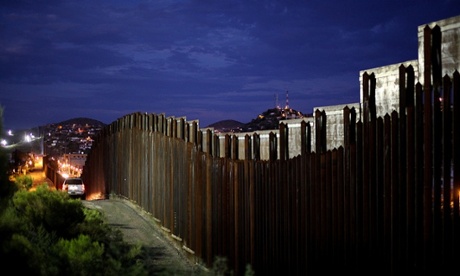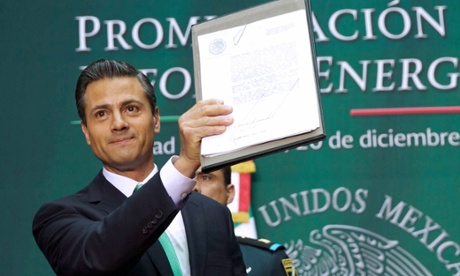Dan Roberts
theguardian.com, 
Mexican and US negotiators are poised to announce a relaxation of border controls for “trusted” business travellers during a summit that is likely to underscore the growing gulf between North American economic liberalisation and stalled immigration reform.
President Enrique Peña Nieto of Mexico, prime minister Stephen Harper of Canada and US president Barack Obama will meet on Wednesday in the Mexican industrial city of Toluca, to mark the 20th anniversary of the North American Free Trade Agreement (Nafta) by holding talks on further commercial integration between the countries.
Officials speaking in advance of the North American leaders summit say a centrepiece of their communique is likely to be a new agreement to speed up the movement of executives and other regular travellers, primarily by establishing a single continent-wide system of pre-screening for certain individuals.
“There are several national trusted traveller programmes already in place like Nexus, Global Entry, Sentry, and in the case of Mexico, Viajero Confiable,” a senior source in the Mexican ministry of foreign affairs told the Guardian.
“The three countries will start by mutually recognising those programmes so it will be a matter of putting all the information of those three programmes together in order to get a North American trusted traveller programme.”
Any such reform of US border controls would require much greater information sharing between national authorities and is likely to be scrutinised carefully in Washington, where Republicans have warned President Obama not to use his executive powers to circumvent their opposition to broader immigration reform proposals.
But a successful initiative to ease convenience for corporate travellers will also highlight the disparity between the growing financial integration between Mexico and the US and the estimated 13 million undocumented immigrants, who are living in the legal shadows as a result of failures to officially recognise human flows across the border.

In the absence of White House progress on immigration reform and an impasse with Canada over energy policy, the three countries have agreed that the summit agenda will be heavily focused on improving commercial ties rather than more contentious social or environmental issues.
One senior US administration official said: “The kinds of things that we’re going to be working on as part of this summit are going to be initiatives aimed at improving our inclusive and shared prosperity – for example, by facilitating Trusted Traveler Programs among our three countries, working to harmonise trade information for importers and exporters, working where we can to collaborate more effectively on our transportation planning, [and] reinvigorating our work on regulatory cooperation.”
The legacy of Nafta, which came into force in January 1994, remains controversial in the US, particularly among Democrats in Congress, who oppose current White House proposals to negotiate further trade agreements with Asia and Europe due to fears that liberalisation has hit manufacturing jobs.
Obama administration officials privately acknowledge that talks over the Trans Pacific Partnership (TPP) talks with China are at a “critical point”, but insist that including Mexico and Canada is a way to make up for some of the social shortcomings of Nafta.
“There’s been some criticism in the past around some of the issues that were not addressed in Nafta,” said one senior US administration official.
“Frankly, that’s all the more reason to do TPP, because what TPP does is it allows us to address some of the issues that were not a part of the Nafta agreement on labour, on the environment, so that we’re essentially bringing this agreement into the 21st century and broadening the group of countries that are in the trading block with North America.”
Mexican officials said Toluca, which is home to a number of multinationals, including Coca Cola, Chrysler, Mercedes Benz and BMW, will also play host to visiting executives and entrepreneurs who will meet the three presidents during Wednesday’s summit.

No comments:
Post a Comment